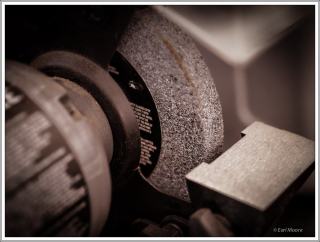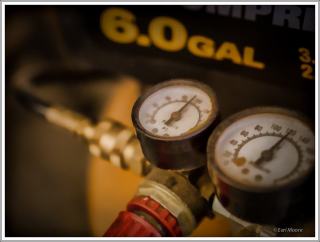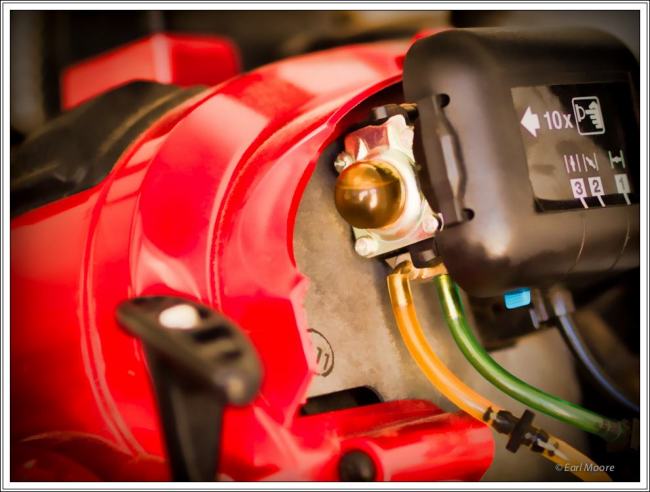The last week was full of preparation for the outdoors, spring and another summer.
The yard equipment is all ready now — inspections, repairs, changing oil/filters, cleaning air filters, greasing spindles and sharping blades. I’ll admit there’s pleasure for me in preforming these tasks and more than a small amount of satisfaction when they’re done. It also connects me to my father.
 I’ve mentioned I was raised on a small farm. In my father’s time there was no such thing as a disposable society or way of living. He certainly never had very much disposable income and always lived by if you wanted something, you worked hard, saved your money, bought it for cash and then took meticulous care of it so it lasted forever. Most home and farming equipment he ever owned he purchased used and those same pieces were still functioning decades later when he passed away.
I’ve mentioned I was raised on a small farm. In my father’s time there was no such thing as a disposable society or way of living. He certainly never had very much disposable income and always lived by if you wanted something, you worked hard, saved your money, bought it for cash and then took meticulous care of it so it lasted forever. Most home and farming equipment he ever owned he purchased used and those same pieces were still functioning decades later when he passed away.
His farming began with a 1938 model Ford tractor which was later upgraded to a slightly larger one from the 40’s or early 50’s. This second tractor worked the farm for close to 40 years and I personally spent many a long day on it as I was growing up. The same was true of the mowers, sowers, plows, disks and other equipment he accumulated. Equipment or tasks he didn’t or couldn’t own or do himself he bartered for with his labor or payed someone to do.
 This philosophy wasn’t limited to his farming efforts, it was the way he lived his life. I could name/count most of the cars and pickups he ever owned on one hand. The first new vehicle I can remember him buying (a ’64 Ford pickup) was a big deal for the whole family. He drove that truck for 20 years and when he sold it it was still in great shape.
This philosophy wasn’t limited to his farming efforts, it was the way he lived his life. I could name/count most of the cars and pickups he ever owned on one hand. The first new vehicle I can remember him buying (a ’64 Ford pickup) was a big deal for the whole family. He drove that truck for 20 years and when he sold it it was still in great shape.
I don’t believe he was unique in this philosophy. Many if not most of his generation lived the same way. Certainly those were different times and a different philosophy of living from what seems to exist for many today. These days planned obsolescence is often calculated in the early design phase.
These were thoughts occupying my mind as I recently mowed the yard with our seven year old mower that seems to run and mow better now then it did when new. I may never own, or hopefully need, another mower.
Thanks, Dad. I was listening and watching even when you probably thought I wasn’t…at least on some things! :-)


Lovely shots those are Earl. What did you use for that grinder wheel? Was the focal blur done in post? Just so nice.
I’ve always valued my things and -tried- to take good care of them. But like many things, what I aspire to do and what I actually do can be miles apart sometimes.
Hi Richard, and thanks! The focus and Bokeh was all in camera. I used an Olympus OM-D camera with a Olympus 45mm f/1.8 lens at 1.8 to achieve a narrow depth of field. The out of focus area for this lens is always very nice which was why I selected it. I did add a little vignetting around the edges during post-processing.
I certainly don’t always live up to my intentions when it comes to taking care of my things but I always feel a little better when I do. :-)
Taking care of good equipment is a large part of the satisfaction one gets from owning it. There are a lot of things that just can’t be user-serviced like they used to be. I still like puttering around in my workshop, with the tools I have. I think it might be a great project to photograph some of them.
Sounds like our Dads taught us both some valuable lessons when they didn’t think we were paying attention.
Tom, I’m sure your tools are well cared for and would provide some wonderful photographic opportunities. Just the creative process of finding new ways to view and photograph them is a worthwhile mental/visual exercise.
Our Dads did well by us and I hope that I passed along some of that wisdom. :-)
I like things that last, too. And there is that satisfaction that comes from taking care of things, even little things. My mower was 6 years old when I bought it but it was well taken care of and it runs fine.
I like these shots, especially the grinding wheel. I can’t tell if it’s processed in full color or as a duo-tone.
Ken, there was a little toning in the grinder image processing but not a duo-tone process. Thanks!
I too like to make things last rather than replace them at the first sign of problems. Mowers, cars, computers, even cameras (when I don’t break them).
Sweet shots Earl. My favourite is the one with the dials.
Cedric, I’m not surprised…you’ve proven that even when broken you can squeeze creative function from some pieces of equipment. :-)
Those dials are from a small air compressor I have in my garage. Thanks!
So much of what you write rings very true. My parents brought me up to value things too and make them last. Last year we finally ditched a mower that must have been a dozen years old. It sill started, but one of the brackets holding a wheel finally sheared off and that was the end of it. Just this last weekend I serviced the mower – cleaned the sir filter, changed the engine oil etc. Always a quiet satisfaction when it then starts first time. The grass has been mowed – a signal that winter has ended – all we need now is for the weather to acknowledge that fact!
Andy, I believe for our parents generation it was very much a necessity — you made things last or you didn’t have anything. For us, not so much. We’re kind of a “bridge” generation but I hope our children in general can still find these feeling of satisfaction in making things last and keeping them working. Thanks for contributing to the conversation here! :-)
Making things that last. What a “novel” idea! Nice series of photos – well done!
John, maybe it’s one of those ideas that will come back into style! Thanks.
I do wonder if this is going to be lost in the “new phone every 6 months” generation. So much goes out of sight then out of mind when we throw stuff away. There are a lot of lessons to be learned in having to follow something from purchase to disposal to its final resting spot with so many things.
That first photo with the green, blue, and yellow hoses and digital display looks to be something pretty high tech! Tractor/spaceship?
I wonder about that too, Mark. Also, as mentioned in Monte’s comment below, there are so many things designed now so they can’t even be repaired and are cheaper replaced.
That first photo, not so high tech — a small 4-cycle leaf blower motor. :-)
Well – my leaf blower has a cheap plastic on/off switch! :-)
The question I always ask is where do we dispose of these short lived items? The landfill? Anyway, your post reminded me of a discussion I had with my father a while back. I told him I admired his ability to fix things that broke down. He laughed and said, “Well, they use to make things so you could repair them. I can’t repair the new contraptions.” I presently have a 14 and 16 year old grandchildren living with me who have that “planned obsolescence” philosophy, about everything. Even relationships are seldom long lasting. Another well written post and series of images that tell a story all by themselves.
Hi Monte, good question. I do believe recycling has improved greatly lately but still has a long ways to go. The knowhow and ability to actually repair things may be lost in a few more generations…at least for consumer goods. Thanks.
Excellent post, Earl. I must admit that I”m not so good about caring for my tools, save for my camera, but perhaps you have inspired me a bit. :)